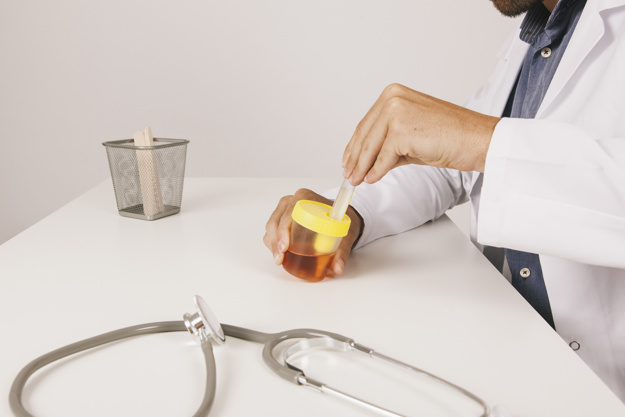The state of Pregnancy is a very delicate situation that requires a lot of nurturing, monitoring and care. There are many cases in pregnancy where complications are prone to occur for some seemingly mild but very serious reasons. In this article, we will be looking at protein and ketones in urine pregnancy and will also be mapping out reasons why they cannot be over emphasised during pregnancy.
What are Ketones?
KETONES
Ketones consist of mixture of acetoacetate, acetone and beta-hydroxybutyrate, produced from the breakdown of lipids when the body’s metabolic needs are not met by glucose. Any reduction in glucose supply, such as decreased oral intake or a diet low in carbohydrate, will result in an increase in ketones levels.
Role Of Ketones during pregnancy
The synthesis of ketones is enhanced in pregnancy, particularly within the third trimester, caused by high-energy demands and increased maternal lipid metabolism in response to increased maternal insulin resistance. Maternal ketones are supplied to the fetus through passive diffusion across the placenta. Therefore Ketones in urine pregnancy are quite noticeable.
Are High Ketones In Urine During Pregnancy Bad?
Ketones in urine pregnancy are very common. Ketones are by-products of fat breakdown in the body. When found in the urine during pregnancy indicates that there are not enough calories at regular intervals during the day or it could mean that the blood glucose is too high. Small amounts of ketones in your morning urine can result from eating less which may have occurred the previous day.

Protein In Urine During Pregnancy
Protein in the urine (proteinuria) may be a sign of distress like stress, preeclampsia or a fever.
It is important to note that protein in urine during pregnancy is excreted more than usual. Research shows pre-pregnancy protein production in urine increasing from up to 150 milligrams per day (150 mg/d) and up to 300 milligrams per day (300 mg/d) in pregnancy.
Why Is High Protein In Urine During Pregnancy Bad?
Urinary protein is considered abnormal in pregnant women when it exceeds 300 milligrams per day at any time during gestation. Protein found in the urine recorded before pregnancy or before 20 weeks’ gestation suggests preexisting renal disease.
Before 20 weeks of pregnancy, proteinuria is usually referred to as chronic proteinuria.
A test for protein in urine during pregnancy is important because it helps the midwife or caregivers to observe and investigate any damage to the kidney or other complications that may have risen during the pregnancy.
Why jumping to such conclusion? You may wonder. Research shows that increased blood volume taxes the kidneys more than normal, and pregnancy itself is a risk factor for protein in urine. The kidneys are hard at work during pregnancy and in fact all the time. So, they filter the waste products in the blood while also keeping things like proteins, that your body needs to function. After the filtering process, the waste is then released into the urine.
Though having little amounts of protein in the urine is common in pregnancy. Discharge of protein can be a sign of a more serious problem thereby a diagnosis for the presence of protein in urine is necessary.
Testing for protein in urine during pregnancy also helps care givers identify when there is a kidney problem. The care givers check for normalcy in the kidneys and also investigate further to be sure that there are no other issues that need urgent attention.
Record shows that if protein makes its way to the urine, it is because there might be a problem in the kidneys. Usually outside pregnancy, protein in the urine may pose a problem as a result of:
- Physical or emotional stress
- Fever
- Dehydration
- Strenuous exercise
- Exposure to extreme temperatures
Though, in some other cases, protein in the urine could be a more serious problem. But in pregnancy, protein in the urine could also be a sign that the body is fighting an infection. It may also be due to underlying issues with the kidneys or other health conditions that may not necessarily be related to pregnancy, like heart disease. Here the midwife or caregiver may have to send the urine sample to the hospital to check for a UTI (urinary tract infection) and if comes out positive, the doctor will prescribe an antibiotic that is safe to consume in a pregnant state. Urinary tract infections can elevate the protein levels in the urine and demand medical attention.
After 20 weeks, during pregnancy, the caregivers or doctors pay more attention to protein as a possible sign for preeclampsia. This condition is marked by high blood pressure and could cause damage to organs, particularly the liver and kidneys.
The care giver or midwife will take notes and will add the observed proteinuria levels to the maternity notes they keep for their patients. She will note whether there is a small amount known as the trace level. They usually have a way of marking it to determine the protein level. It is advisable to ask questions if this is not clear to you during your maternal appointments. Your midwife or caregiver may bring forward your next maternal appointment, depending on the observed proteinuria level. They usually check again for traces or the presence of the protein or if it is increased.
They are usually vigilant for proteins in the urine especially if the pregnancy is in its second half stage because this may indicate signs of pre-eclampsia, which a serious medical condition in pregnancy. Protein in the urine plus high blood pressure is said to be a sign of preeclampsia. So, if the urine sample contains a high level of protein and the blood pressure is high, the caregivers may take a blood sample to check the blood count, clotting, kidney and liver function. If there is a need for concern to the caregiver on the proteinuria level or other symptoms like the high blood pressure, they may carry out necessary tests. If the proteinuria is found to be at a safe level with no other concerns, the patient is released. Otherwise, if found to need attention, then the patient is advised to remain for further monitoring.
Conclusion
Keeping protein and ketones in urine pregnancy under control is highly important. These days the doctors or midwifes already take necessary steps to diagnose problems, if there are any or advice medication whenever necessary. In order to keep them under control, it’s advisable to take precautions before hand. Try pregnancy diet which can help you in keeping protein and ketones in urine pregnancy stable. Always consult your doctor before taking any medication. If possible get your diet also pre-approved by a good dietician so you can keep things under check.















+ There are no comments
Add yours